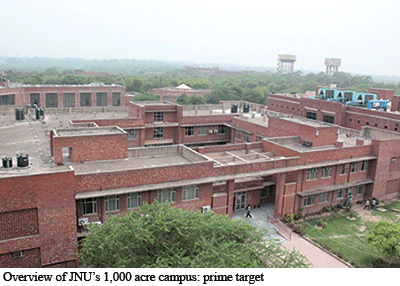 Over the past year, the top-ranked Jawaharlal Nehru University (JNU), Delhi has been in the news for all the wrong reasons. Student agitations, anti-government protests and campus violence have transformed this Central government-funded postgraduate university — established in 1969 by a special Act of Parliament and named after the country’s first, and self-styled socialist prime minister Jawaharlal Nehru — into a live theatre for clashes between idealistic left-wing students and newly resurgent right-wing students unions affiliated with the Rashtriya Swayamsevak Sangh (RSS) and the sangh parivar (RSS family) — the driving force behind the BJP-led NDA government which swept to power with a massive majority in General Election 2014.
Over the past year, the top-ranked Jawaharlal Nehru University (JNU), Delhi has been in the news for all the wrong reasons. Student agitations, anti-government protests and campus violence have transformed this Central government-funded postgraduate university — established in 1969 by a special Act of Parliament and named after the country’s first, and self-styled socialist prime minister Jawaharlal Nehru — into a live theatre for clashes between idealistic left-wing students and newly resurgent right-wing students unions affiliated with the Rashtriya Swayamsevak Sangh (RSS) and the sangh parivar (RSS family) — the driving force behind the BJP-led NDA government which swept to power with a massive majority in General Election 2014.
A raucous anti-establishment citadel and bastion of student and faculty lefties for over five decades, JNU has become a prime target of the Akhil Bharatiya Vidyarthi Parishad (ABVP) — the students wing of the RSS/BJP — which instigated the arrest of Kanhaiya Kumar, president of the JNU Students Union (JNUSU), in February last year. Kumar was accused of raising “anti-national” slogans at a protest rally to mark the third anniversary of the execution of Kashmiri terrorist Afzal Guru, sentenced to death by the Supreme Court after an exhaustive set of trials and appeals in 2005. A hate object of RSS/BJP ideologues and ABVP as an over-privileged, over-subsidised university for children of the English-fluent socialist priviligentsia with barely concealed contempt for Hindi-speaking students of the BIMARU (Bihar, Madhya Pradesh, Rajasthan and Uttar Pradesh) states who have crowded into JNU under reserved quotas for scheduled castes, scheduled tribes and OBCs (other backward castes), JNU became a prime target of the RSS/BJP after the electoral victory of the BJP, to weed out “anti-nationals” and cleanse its Augean stables.
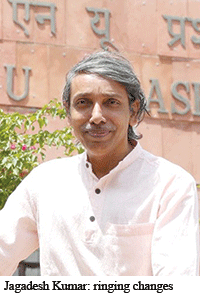 The first step of the cleansing process was appointment of Dr. M. Jagadesh Kumar, hitherto professor of electrical engineering at IIT-Delhi and RSS sympathiser, as vice chancellor of the university in February 2016, following the end of tenure of former VC Sudhir Kumar Sopory. After his appointment as VC Jagadesh Kumar has lost little time in ringing in changes. Among them: slashing the annual student intake of heavily-subsidised Ph D programmes from 1,261 in 2016-17 to 194 this year; introducing an interview based admission system; and undertaking an unprecedented recruitment drive for 300 new faculty.
The first step of the cleansing process was appointment of Dr. M. Jagadesh Kumar, hitherto professor of electrical engineering at IIT-Delhi and RSS sympathiser, as vice chancellor of the university in February 2016, following the end of tenure of former VC Sudhir Kumar Sopory. After his appointment as VC Jagadesh Kumar has lost little time in ringing in changes. Among them: slashing the annual student intake of heavily-subsidised Ph D programmes from 1,261 in 2016-17 to 194 this year; introducing an interview based admission system; and undertaking an unprecedented recruitment drive for 300 new faculty.
Regrettably repeated attempts of your correspondent to contact Jagadesh Kumar and obtain the rationale of his reform drive in this high-profile university, proved unsuccessful. Ditto a subsequent effort by your editor who obtained a promise from the VC to respond to an e-mailed questionnaire.
Be that as it may, as a consequence of the sweeping reforms being implemented by Jagadesh Kumar who clearly has the full backing of Union HRD minister Prakash Javadekar, the profile of JNU students could change drastically over the next few years as the new admission system allows the administration headed by the vice chancellor to supervise admissions. The earlier system of consultation with faculty and the academic council, which allowed professors to influence the choice of Ph D candidates, has been abrogated with the VC having a decisive say in admissions, a reform that’s already been challenged in the courts by the faculty.
Even though most of JNU’s Left-liberal faculty tends to be critical of the swift reforms of Jagadesh Kumar because of his alleged RSS/BJP sympathies, some among them approve of his decision to drastically slash the number of Ph D scholars ubiquitous on the JNU campus for the past several decades. Over the years the ratio of doctorate scholars to professors had become unmanageable resulting in the quality of Ph D theses nose-diving. Moreover, it’s hardly a secret that a large number of JNU scholars are disguised unemployed, deeply involved in campus and beyond politics, availing the heavily subsidised accommodation and Rs.8,000-plus monthly stipends while nominally researching their doctoral theses which typically take four years to complete.
Within the salubrious environs of JNU’s 1,000-acre campus, many postgrad students engage in the popular national activity of ‘time pass’ while looking for undemanding and lucrative government jobs. Although all subjects are taught in English, Hindi is the lingua franca of JNU. Therefore the quality of their M.Phil papers and Ph D theses which have to be submitted in English, often tends to be rock-bottom. “Given that half the students on campus are very weak in English, the faculty have to labour hard to edit, correct and re-write submissions. The quality of thesis papers submitted by the university’s scholars varies widely and most of the output is junk,” says a JNU professor who understandably prefers anonymity.
| JNU snapshot
Established: November 14, 1969 |
Although there’s an emerging consensus that partying has to end in this over-hyped university which receives a massive government grant of Rs.319 crore per year and has little to show for it, there’s widespread fear and suspicion within the faculty and student bodies that the proposed reforms and belt-tightening measures are designed to destroy academic freedom and lower the drawbridge for faux intellectuals of the RSS and sangh parivar, and half-baked graduates of corruption-ridden colleges of the BIMARU states. The university’s well-entrenched leftist students unions continue to repose faith in discredited socialist ideologies, notwithstanding their conspicuous failure globally.
They discern a well-planned strategy of the RSS and BJP leadership to make the ABVP a force to be reckoned with on Indian campuses, starting with the prized JNU campus. Over the past three years since prime minister Narendra Modi took charge at the Centre, the ABVP has made a concerted bid to assert itself on university campuses — hitherto dominated by Left and/or pro-Congress student unions — countrywide.
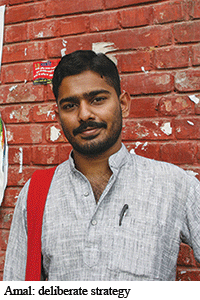 Amal P.P, vice president of the JNUSU which is affiliated with the Students Federation of India, the student wing of the Communist Party of India-Marxist (CPM), is convinced there’s a deliberate strategy to brand JNU as a hotbed of radical, “anti-national” — a favoured pejorative of BJP spokespersons — activities to pave the way for ABVP and other pro-BJP organisations to dominate JNU. “The culture of JNU since its inception is to have a politically active campus within an environment of open debate, critical thinking and toleration of diverse viewpoints. Until recently there’s never been any violence on the campus — we’ve never been branded anti-national or a Marxist/Maoist bastion. There are some radical students with extreme views but they are in a minority and usually ignored. But last year a sedition case was filed against them on the basis of a concocted video. The false demonisation of JNU as an anti-national institution has allowed the ABVP to indulge in violence and extremism on the campus. For instance, it was ABVP activists who beat up JNU student Najeeb Ahmad, and the next day he disappeared. He is now missing for seven months,” says Amal, a Ph D scholar.
Amal P.P, vice president of the JNUSU which is affiliated with the Students Federation of India, the student wing of the Communist Party of India-Marxist (CPM), is convinced there’s a deliberate strategy to brand JNU as a hotbed of radical, “anti-national” — a favoured pejorative of BJP spokespersons — activities to pave the way for ABVP and other pro-BJP organisations to dominate JNU. “The culture of JNU since its inception is to have a politically active campus within an environment of open debate, critical thinking and toleration of diverse viewpoints. Until recently there’s never been any violence on the campus — we’ve never been branded anti-national or a Marxist/Maoist bastion. There are some radical students with extreme views but they are in a minority and usually ignored. But last year a sedition case was filed against them on the basis of a concocted video. The false demonisation of JNU as an anti-national institution has allowed the ABVP to indulge in violence and extremism on the campus. For instance, it was ABVP activists who beat up JNU student Najeeb Ahmad, and the next day he disappeared. He is now missing for seven months,” says Amal, a Ph D scholar.
Amal’s argument that too much is being made of JNU student politics by the ruling political dispensation, is endorsed by Pradeep Mehta, the Jaipur-based president of CUT, the country’s leading think tank on trade and consumer issues. “JNU is an institution of higher learning — not a hotbed of political activity. Like students of the best universities the world over, JNU students engage in political discourse and debate which is absolutely legitimate. Besides, nearly all student unions in the country are mentored by political parties from whose ranks the country’s future political leaders are drawn,” says Mehta.
Undoubtedly the spectacular success of the BJP in General Election 2014 and its electoral victories in several states, especially in Uttar Pradesh — the country’s most populous (215 million) state — two months ago, has emboldened RSS and sangh parivar activists to express their long pent-up aversion to Nehruvian socialism which undeniably impoverished post-independence India. Unfortunately as a result, the unifying and progressive ideologies of a secular state and protection of the rights of religious and other minorities have also become targets of the RSS/BJP which has been packing academic institutions — Indian Council for Historical Research, the Censor Board and Film & Television Institute of India — with ill-qualified RSS ideologues. Little wonder there’s widespread apprehension within JNU that this showpiece liberal university is in the crosshairs of the RSS/BJP leadership.
However, Dr. Arun Kumar, a former professor of economics at JNU, believes that JNU is wrongly labelled as a Left bastion. “It’s important to distinguish between Left and liberal ideologies. Propaganda that JNU is packed with leftist radicals is overblown. Out of the 600 faculty only about 20-30 are hardcore communist party members. Another hundred or so are Left of Centre while the majority are liberals. JNU is not connected to any particular party or political ideology. No matter which party has been in power at the Centre, JNU has always been an essentially liberal and anti-establishment university, speaking up for the poor and exploited sections of society,” says Arun Kumar.
Within academia there’s undoubtedly widespread acceptance of JNU’s credentials as an open, liberal university in which debate and discussion of the country’s deepest problems are officially encouraged. However there’s a general consensus among the intelligentsia that the university is caught in a time warp. Its faculty and students obstinately cling to discredited Left ideologies and ideas despite the fall of the Berlin Wall, collapse of the Soviet Union and ruination of West Bengal during 34 years of uninterrupted rule of the CPM-led Left Front government (1977-2011).
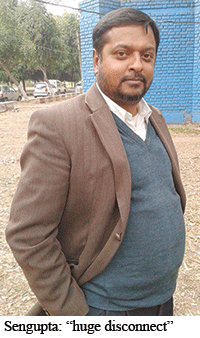 “There is a huge disconnect between JNU and the nation,” says Prof. Dipankar Sengupta, a JNU alumnus and former faculty member, and currently professor of economics at Jammu University. “This disconnect is becoming increasingly wider because JNU faculty are on the wrong side of history. The disconnect is mainly in the social sciences, languages and international studies departments. Faculty and students in these schools continue to cling on to Left ideologies that have been abandoned worldwide.”
“There is a huge disconnect between JNU and the nation,” says Prof. Dipankar Sengupta, a JNU alumnus and former faculty member, and currently professor of economics at Jammu University. “This disconnect is becoming increasingly wider because JNU faculty are on the wrong side of history. The disconnect is mainly in the social sciences, languages and international studies departments. Faculty and students in these schools continue to cling on to Left ideologies that have been abandoned worldwide.”
Extreme politicisation and anti-establishment debates and protests have adversely affected academics and quality of research output in this postgrad university, which half a century since it was founded with great ambition and aspirations, is ranked a lowly #96 in the authoritative Times Higher Education Asia University Rankings 2016-17, well below several Chinese and South-east Asian universities. Clearly, JNU has experienced a steep fall in teaching and research standards with students preoccupied with matters greater than academics.
“There has been a sea change in the academic culture of JNU in the new millennium,” laments Dr. Raviprasad Narayanan, a China expert at JNU’s School of International Studies. “There are student agitations and protests all the time and one never knows whether a class will be held as per the time-table. Earlier even when hunger strikes were called, students attended classes. Now bunking is the norm.”
According to Narayanan, an alumnus of JNU and the National Chengchi University, Taipei, JNU’s admissions policy, which under its sui generis deprivation points system dilutes admission norms for students from designated backward districts of Uttar Pradesh and Bihar, has contributed significantly to deterioration of academic standards. Under the deprivation points system the university, which is constitutionally obliged to reserve 49.5 percent of capacity for scheduled castes, schedules tribes and OBCs, also awards additional points in its entrance exams to candidates from a few designated backward districts of these two states. Although such affirmative admission policies are laudable from the social justice and equity perspective, in practice they have had a disastrous impact on academic and research standards in JNU.
Inevitably, statistical information and data pertaining to the student mix of JNU is dated. According to a 2011-12 survey, 1,046 of the 1,935 students admitted into JNU that year were from the northern states of Uttar Pradesh, Bihar, Rajasthan and Delhi. Against this, the total number of students admitted from the relatively more educationally advanced southern states (Tamil Nadu, Kerala, Andhra Pradesh and Karnataka) aggregated a mere 132.
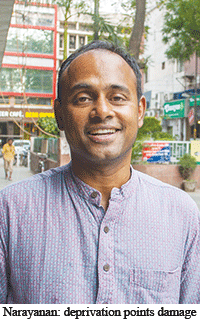 “A disproportionately large number of students from the backward states of north India where school and undergrad education standards are very poor, have been admitted into JNU during the past two decades, and this has severely diluted academic standards. Earlier, JNU was a secular, cosmopolitan university with students from around the country. Today, it is a Hindi heartland institution in which even Hindi is spoken in several dialects difficult to decipher. Moreover most students utilise the university as a halfway house for entry into the civil services and public sector enterprises. It has become the cheapest hostel in Delhi for students shopping around for government jobs while getting paid for it,” says Narayanan.
“A disproportionately large number of students from the backward states of north India where school and undergrad education standards are very poor, have been admitted into JNU during the past two decades, and this has severely diluted academic standards. Earlier, JNU was a secular, cosmopolitan university with students from around the country. Today, it is a Hindi heartland institution in which even Hindi is spoken in several dialects difficult to decipher. Moreover most students utilise the university as a halfway house for entry into the civil services and public sector enterprises. It has become the cheapest hostel in Delhi for students shopping around for government jobs while getting paid for it,” says Narayanan.
Curiously, while student fees in the Central-government funded IITs and IIMs have quadrupled over the past 20 years, in JNU tuition fees have remained static for over three decades. A graduate student who enrols in an M.Phil programme in JNU pays a one-time fee of a mere Rs.280. Thereafter she is paid a stipend of Rs.5,000 per month. Research scholars are entitled to a monthly stipend of Rs.8,000 — of which the hostel rent is a mere Rs.100 per month and mess charges are Rs.2,000-2,500 per month.
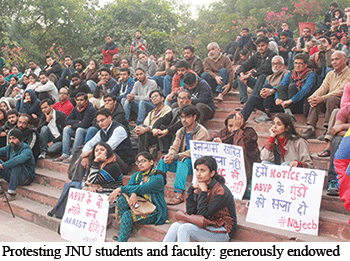 Small wonder that according to the JNU annual report 2015-16, despite a massive Central government grant of Rs.319 crore, the university’s expenditure at Rs.492 crore was substantially higher than its aggregate income of Rs.347 crore. The income generated from academic receipts which includes students’ fees amounted to a mere Rs.7 crore. Meanwhile, ‘establishment expenditure’ on students and faculty has skyrocketed from Rs.43 crore in 2006-07 to Rs.352 crore in 2015-16.
Small wonder that according to the JNU annual report 2015-16, despite a massive Central government grant of Rs.319 crore, the university’s expenditure at Rs.492 crore was substantially higher than its aggregate income of Rs.347 crore. The income generated from academic receipts which includes students’ fees amounted to a mere Rs.7 crore. Meanwhile, ‘establishment expenditure’ on students and faculty has skyrocketed from Rs.43 crore in 2006-07 to Rs.352 crore in 2015-16.
For the nominal fees they pay, JNU students and faculty, who receive handsome Seventh Pay Commission award remuneration packages including free housing, are provided generously endowed infrastructure facilities. The 1,000-acre campus in south Delhi houses an integrated academic complex, administrative building, a student activity centre, health centre, science instrumentation centre, a Kendriya Vidyalaya (for faculty children) and a well-endowed library housing 632,000 books and 1,638 journal subscriptions. Indeed JNU offers its 8,500 students perhaps the most expansive and environmental-friendly campus in the country. Check dams built during the tenure of former vice chancellor Dr. Asis Datta have transformed the campus into a sea of green.
Academically too, this Central university which offers MA/M.Sc, M.Phil and Ph D degree programmes to 8,500 students instructed by 600 faculty, enjoys a sound reputation nationally for liberal arts and basic sciences education and research. The Union human resource development (HRD) ministry’s National Institutional Ranking Framework (NIRF) 2017 ranks JNU #2 countrywide after the Indian Institute of Science, Bangalore. In the EducationWorld 2015 league table of India’s Top 200 universities, JNU was ranked #3.
International varsity rating and ranking agencies whose evaluation standards are more rigorous are less impressed. In the Quacquarelli Symonds (QS) arts and humanities category, JNU is ranked #247 worldwide — after Delhi University which is at #210. In the Times Higher Education’s Top 100 Asian Universities league table, JNU is ranked #96, below the Indian Institute of Science, Bangalore, Punjab University, five IITs, and even lower than Aligarh Muslim University.
| JNU: Abbreviated history
“There were massive riots taking place, communal tension, language agitations and finally an inconclusive war with Pakistan in 1965,” recalls Prof. Rakesh Batabyal, author of JNU: The Making of a University (2015). At the time, Union education minister M.C. Chagla, mooted the idea of setting up a national university patterned on the Boston Model. “The primary objective behind setting up the university was national integration and promotion of excellence at a time when several Indian universities were in crisis,” says Batabyal. The Jawaharlal Nehru University Act was passed by Parliament in 1966. But it took several years for JNU to become operational. Protracted political instability in the country postponed formal inauguration of the university to November 1969. The official mission of the university is “to disseminate and advance knowledge, wisdom and understanding by teaching and research; and by the example and influence of its corporate (sic) life to promote the study of the principles for which Jawaharlal Nehru worked during his life-time, viz, national integration, social justice, secularism, a democratic way of life, international understanding and a scientific approach to the problems of society.” The university’s first vice chancellor was journalist turned diplomat G. Parthasarathi, who attracted some of the country’s most respected intellectuals to serve as faculty. Among them: Raj Krishna, Y.K. Alagh, C.P. Bhambhri, Bipin Chandra. Parthasarathi was succeeded by several eminent vice chancellors including K.R. Narayanan, later President of India, and Yoginder K. Alagh, a prominent member of the Planning Commission. The university’s anti-establishment culture took root when the internal Emergency was proclaimed in 1975. Since then JNU students have earned a reputation for being vocal, radical, iconoclastic, with the university transforming into a bastion of leftist students and faculty. |
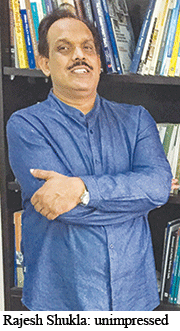 Unsurprisingly, Dr. Rajesh Shukla, former head of research at the National Council for Applied Economic Research (NCAER) and incumbent promoter-director of People Research on India’s Consumer Economy (PRICE), a Delhi-based think tank, is unimpressed by the quality of JNU postgraduates and Ph Ds. “JNU research scholars tend to lack depth although because of their political exposure they are superficially bright and articulate. Because of JNU’s internally enforced homogeneity, its graduates are inbred, and out of step with a dramatically changed world. Moreover, lack of interaction and collaboration with other institutions has hindered the development of an open, receptive mentality and percolation of new ideas into JNU,” says Shukla.
Unsurprisingly, Dr. Rajesh Shukla, former head of research at the National Council for Applied Economic Research (NCAER) and incumbent promoter-director of People Research on India’s Consumer Economy (PRICE), a Delhi-based think tank, is unimpressed by the quality of JNU postgraduates and Ph Ds. “JNU research scholars tend to lack depth although because of their political exposure they are superficially bright and articulate. Because of JNU’s internally enforced homogeneity, its graduates are inbred, and out of step with a dramatically changed world. Moreover, lack of interaction and collaboration with other institutions has hindered the development of an open, receptive mentality and percolation of new ideas into JNU,” says Shukla.
The predominance of Left, anti-capitalist and business ideologies on the JNU campus has also rendered the great majority of graduates unfit for corporate jobs. “In its early years, JNU was prolific in feeding the civil services but over time, engineers and MBAs have begun to disproportionately dominate the Indian bureaucracy. As a result JNU graduates have been pushed to the margins of the country’s power structure. In post-liberalisation India they have gravitated towards academia, informal politics and the social sector,” says Chiranjit Banerjee, head of the Bangalore-based HR consultancy, PeoplePlus.
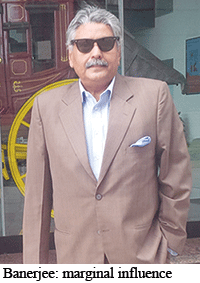 Rumjhum Chatterjee, group managing director and head (human capital) of the Delhi-based Feedback Infra Pvt. Ltd and chairperson of the Confederation of Indian Industry (CII) Northern Regional Council, endorses the opinion that predominance of Leftist ideologies has rendered JNU graduates unsuitable for jobs in corporate India and multinationals. “JNU students fare better in research think tanks and policy making. Perhaps because of the university’s leftist culture, they tend to be uncomfortable in the corporate sector. There’s a wide divide between the JNU environment and corporate reality,” says Chatterjee.
Rumjhum Chatterjee, group managing director and head (human capital) of the Delhi-based Feedback Infra Pvt. Ltd and chairperson of the Confederation of Indian Industry (CII) Northern Regional Council, endorses the opinion that predominance of Leftist ideologies has rendered JNU graduates unsuitable for jobs in corporate India and multinationals. “JNU students fare better in research think tanks and policy making. Perhaps because of the university’s leftist culture, they tend to be uncomfortable in the corporate sector. There’s a wide divide between the JNU environment and corporate reality,” says Chatterjee.
Indeed, a roll call of JNU alumni indicates that this showpiece Central University has failed to produce graduates who have scaled corporate ladders. Its alumni include a disproportionate number of politicians and bureaucrats — CPM leaders Prakash Karat and Sitaram Yechury, Nirmala Sitharaman, incumbent Union minister for commerce of the BJP/NDA government; Roji M. John, NSUI national president, Amitabh Kant, head of NITI Aayog, Yogendra Yadav, former AAP leader, and Dr. Baburam Bhattarai, the 35th prime minister of Nepal. It is pertinent to note that all these worthies are in politics, academia or government service.
Even in JNU’s heyday in the three decades prior to liberalisation of the Indian economy, the great majority of JNU graduates preferred to enter the academy, politics and the bureaucracy. In the latter fields under the Nehru-Gandhi dynasty, they rose to high offices in government and undoubtedly entrenched the public sector led Nehruvian model which mired the Indian economy in the derisively described Hindu rate of GDP growth — 3.5 percent per year — for over three decades plunging hundreds of million citizens into deep poverty.
Nevertheless, right into the early years of the millennium, JNU was a cool and fashionable — even if not intellectually productive — postgrad university. However, academic standards started steeply plunging when in a desperate bid to win popular acclaim, in 2009 then Union HRD minister Arjun Singh steered a Bill through Parliament to carve out an additional 27 percent quota, i.e, in addition to the 22.5 percent reserved quota for scheduled castes and tribes, for OBCs in all Central institutions of higher education, including JNU. Moreover, under pressure from JNU students and faculty an additional 5 percent was reserved for students from a few selected educationally backward districts of Bihar and UP.
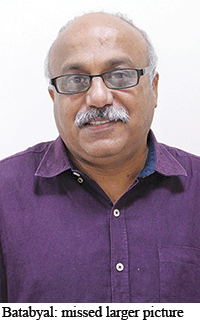 Worse, in 2009, the then vice chancellor, B.B. Bhattachrya, gave in to students’ demands for affirmative action not just in admissions and faculty recruitment, but also in faculty promotions. “The character of the university changed irrevocably in 2009,” says Prof. Rakesh Batabyal, author of the university’s unofficial history JNU: The Making of a University (2015). Batabyal, associate professor in the School of Social Sciences, was among 14 professors who challenged the new reservation policy which was pushed through with the support of the Left-leaning faculty union.
Worse, in 2009, the then vice chancellor, B.B. Bhattachrya, gave in to students’ demands for affirmative action not just in admissions and faculty recruitment, but also in faculty promotions. “The character of the university changed irrevocably in 2009,” says Prof. Rakesh Batabyal, author of the university’s unofficial history JNU: The Making of a University (2015). Batabyal, associate professor in the School of Social Sciences, was among 14 professors who challenged the new reservation policy which was pushed through with the support of the Left-leaning faculty union.
“The Left could not see the larger picture. At a time when we needed to foster excellence, we fell behind while new universities, some private, bypassed us. The problem with the Left, anti-establishment tradition is that it breeds self-righteousness and, in the process, misses out change and growth opportunities. JNU, like every institution, needed to change, adapt and introduce innovative curriculums and pedagogies to keep pace with evolving ground realities. For instance in the social sciences, the university leadership failed to create new centres and instead became populist, to appease students and Dalit communities,” laments Batabyal.
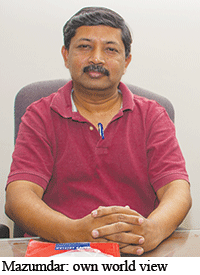 But despite the steady fall of India’s once premier postgrad and pampered university in public esteem, the majority opinion within the 600-strong JNU faculty is that the university isn’t broke and consequently doesn’t need fixing. “In JNU we define our own standards, our own worldview given our history and location in the world rather than simply emulate Western norms. Our standards are very high and our research much more thorough than other universities,” insists Dr. Surajit Mazumdar, professor at JNU’s Centre for Economic Studies and Planning.
But despite the steady fall of India’s once premier postgrad and pampered university in public esteem, the majority opinion within the 600-strong JNU faculty is that the university isn’t broke and consequently doesn’t need fixing. “In JNU we define our own standards, our own worldview given our history and location in the world rather than simply emulate Western norms. Our standards are very high and our research much more thorough than other universities,” insists Dr. Surajit Mazumdar, professor at JNU’s Centre for Economic Studies and Planning.
Against this backdrop of JNU students union and faculty adamantly sticking to discredited Left ideologies and politics, the reform initiatives launched by vice chancellor Jagadesh Kumar have sparked off a war on the campus.
The new VC is trying hard to bring back merit as a criterion for admission of student and faculty into JNU. That’s why the deprivation points system has been scrapped with effect from the new academic year. Also the focus of the VC is on recruiting new teachers and making the sciences more relevant, which means that there will be a major shift in JNU’s character, which has been dominated by social sciences and language studies. The government’s attitude towards JNU has hardened which is why it has slashed M.Phil and Ph D student intake by 86 percent this year. While these reforms are on the right track, there are additional problems that have to be addressed including rising plagiarism by students, fundamental weaknesses in comprehending modern research methodologies and an inability to propound strong original theses,” says Dr. Raviprasad Narayanan, associate professor at JNU’s School of International Studies.
According to a university spokesperson, the sharp reduction in the intake of Ph D students was necessary as JNU professors were supervising an unmanageable number of research students — some as many as 40 each — with the result that the quality of research had suffered steeply. “The sharp cut in the number of Ph D students has rattled nerves on campus for two reasons. First, it will discourage the possibility of seat distribution on the basis of the ideological affiliations of candidates — a practice of the CPM-led Left Front government in West Bengal which brought Calcutta University to its knees. Second, a reduced supervisor-supervisee ratio will prevent compromises on academic rigour. This is much to the chagrin of professional activists who make up for their puny reading lists with lengthy slogans… It is surprising that the issue of quality of research is never raised in JNU. It does not have a publication division, it doesn’t host a journal, the central library is not fully functional as it is under renovation for many months now and departmental libraries lack space and staff. Yet none of these issues ever provoke a chorus on campus,” wrote Arunoday Majumder, a research fellow in the department of sociology in JNU, in Times of India (April 8).
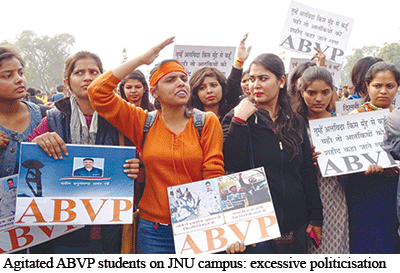 There’s little doubt that excessive politicisation, obstinate allegiance to bygone Left ideologies, skewed admission policies, and indiscriminate and heavy subsidisation of tuition fees have all contributed to this showpiece university’s steady decline. Its high time JNU’s business-illiterate faculty and students get their act together to review its future direction and save it from ruin. This requires depoliticisation of the campus, substantial increase in its student fees and the creation of a technology enabled research culture which requires building bridges with India Inc. and government.
There’s little doubt that excessive politicisation, obstinate allegiance to bygone Left ideologies, skewed admission policies, and indiscriminate and heavy subsidisation of tuition fees have all contributed to this showpiece university’s steady decline. Its high time JNU’s business-illiterate faculty and students get their act together to review its future direction and save it from ruin. This requires depoliticisation of the campus, substantial increase in its student fees and the creation of a technology enabled research culture which requires building bridges with India Inc. and government.
JNU is essentially a postgrad institution. Therefore a higher degree of responsibility and maturity is expected of its student body whose cooperation is vital for the survival, growth and development of this unique institution of learning promoted with the noblest of aims and objectives. Though the institutional reforms being initiated by the new vice chancellor are overdue, there’s also clear and present danger that its dominant leftist culture could be replaced by a regressive hindutva culture which will be worse.
With Summiya Yasmeen (Bangalore)














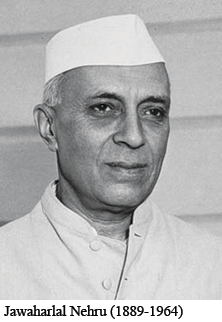 Jawaharlal Nehru University (JNU) was conceptualised during a period of great turmoil. India’s first and professedly socialist prime minister Jawaharlal Nehru, after whom the university is named, had died in 1964 and the country faced political uncertainty and instability.
Jawaharlal Nehru University (JNU) was conceptualised during a period of great turmoil. India’s first and professedly socialist prime minister Jawaharlal Nehru, after whom the university is named, had died in 1964 and the country faced political uncertainty and instability.








